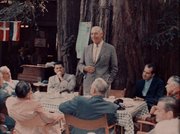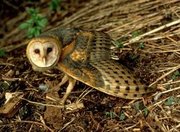Owl
From Plastic Tub
|
Owl n. 1. Nocturnal bird of prey. 2. A coin first produced by the Athenian tyrant Peisistratus, using silver from the Laurion mines 25 miles south of Athens, in 546 BCE. 3. In AA parlance an owl is an elder who is no longer sympathetic with the movement. UsageJorge Suarez once wrote about an encounter he had with a barn owl on a ranch in Venezuela: "Las chuetas malabuenas mirando la noche y torciendo el cogote en mil puertas giratorias. Las tres al mismo tiempo, gritaban: "carne carne" y luego volaban en un vuelo recortado." -- Journal excerpt, 1940. ExtrapolationThe owl has a long and storied history as a popular and resonant symbol. During the Classical Period, for example, anyone could tell you that the owl was the symbol of Athena, Goddess of Wisdom and patron of Athens. Today, the owl is still a popular symbol of sagacity and even school children know that the Owl, the Silver Tetradrachm of Ancient Athens, was the Dollar of its day: universally recognized and accepted currency. See Also |
DesiderataXenophon Aliokrate was sometimes called the "Owl" by his Bulgarian Connections. Mr. Korea had a pet owl named "Lucky." The Bohemian Club, a conservative organization holding annual retreats at Bohemain Grove in Northern California, has an Owl as its symbol. Every year they burn a fire to "cremate Dull Care" in front of a giant concrete owl. A group of owls is oddly called a parliament. |


